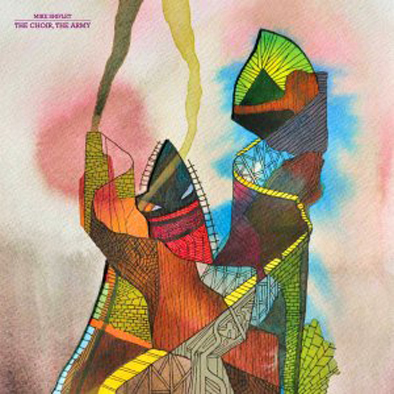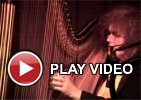Mike Shiflet, "The Choir, The Army"
 This latest release captures the ever-prolific Shiflet in one his more "ambient" moods, offering a more conventionally musical and slightly less-scary window into his work than his recent, more epic Sufferers/Merciless diptych on Type.  Naturally, some of Mike's noisier and weirder impulses still make their (welcome) appearances, but these nine relatively short pieces balance his harsher textural themes with an unexpectedly varied palette of sublime shimmers, woozy guitars, and some very wrong-sounding violin.  This definitely ranks as one of Mike's most inspired release to date (and possibly his best).
This latest release captures the ever-prolific Shiflet in one his more "ambient" moods, offering a more conventionally musical and slightly less-scary window into his work than his recent, more epic Sufferers/Merciless diptych on Type.  Naturally, some of Mike's noisier and weirder impulses still make their (welcome) appearances, but these nine relatively short pieces balance his harsher textural themes with an unexpectedly varied palette of sublime shimmers, woozy guitars, and some very wrong-sounding violin.  This definitely ranks as one of Mike's most inspired release to date (and possibly his best).
Mike Shiflet has found a pretty wonderful and unique way to make drone music, insomuch as he has basically figured out how to make harsh noise seem warm and listenable.  At the risk of sounding like I am gushing, it is a rather marvelous and difficult feat to pull off.  He does not do it with every song on The Choir, The Army, but such pieces certainly dominate the album and give it its character.  The trick sounds rather simple, as he essentially just combines quavering synths with a seething bed of grinding, hissing noise.  The execution is the tough part, however, and Mike nails it perfectly on pieces like "1917," "Zahlentheorie," and "Omnicron Serenade."
Impressively, each of those pieces sounds radically different from the others.  Also, many of the album's other pieces sound even more radically different, yet the album somehow feels thematically coherent and flowing.  It is also endlessly listenable, owing to its unusual and conspicuous absence of melodies or chord changes.  The secret seems to lie in the hyper-minimalism of the music, as these pieces rarely contain anything more than a single note or chord, nor is there any straightforward melodic or harmonic development.  This album is almost entirely textural and the textures are dense, vibrant, and unpredictable enough to seem fresh and visceral every time I listen.  In fact, some songs dispense with any musical component altogether, like the roaring chaos of "Attrition," which sounds like a bulldozer driving through a factory that is on fire (which is a compliment, obviously).
Shiflet allows the pendulum to swing entirely the other way near the end of the album, however, as "Inching" is all shimmering synths and languorous, blurred guitars.  Then the album's brief closer, "Yonder," continues that theme of melodicism, but perverts it into something truly disturbed and disquieting–it sounds like someone playing a mournful, out-of-tune violin along with an insistent, warbling, and discordant tape loop of a guitar while the apocalypse rages outside the window.  I am not sure if it is the album's best, most inventive piece or not, but I do know that nothing could have followed it.
I am truly surprised by how much I love this album, as I did not expect Shiflet to be this absorbing and powerful with such short songs, nor did I expect these nine pieces to cohere into such a beautifully constructed and sequenced suite.  I also did not expect it to be so ingeniously varied, seamlessly combining fragile beauty, cosmic horror, and howling entropy into a twisted fun house of an album that exceeded my expectations in every way.  This is sound art at its absolute best.
 
 




